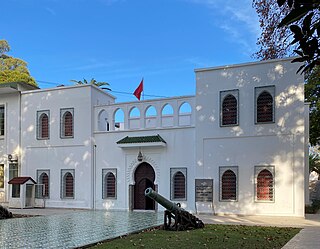This article needs additional citations for verification .(December 2013) |
 |
|---|
| Judiciary |

The Judiciary of Morocco is an independent branch of the Moroccan government, subject only to the Moroccan Constitution.
This article needs additional citations for verification .(December 2013) |
 |
|---|
| Judiciary |

The Judiciary of Morocco is an independent branch of the Moroccan government, subject only to the Moroccan Constitution.
The Moroccan court structure consists of:
In June 2006, Morocco and Argentina signed a bilateral agreement on judicial cooperation.

The International Criminal Tribunal for the former Yugoslavia (ICTY) was a body of the United Nations that was established to prosecute the war crimes that had been committed during the Yugoslav Wars and to try their perpetrators. The tribunal was an ad hoc court located in The Hague, Netherlands.
Federal tribunals in the United States are those tribunals established by the federal government of the United States for the purpose of resolving disputes involving or arising under federal laws, including questions about the constitutionality of such laws. Such tribunals include both Article III tribunals as well as adjudicative entities which are classified as Article I or Article IV tribunals. Some of the latter entities are also formally denominated as courts, but they do not enjoy certain protections afforded to Article III courts. These tribunals are described in reference to the article of the United States Constitution from which the tribunal's authority stems. The use of the term "tribunal" in this context as a blanket term to encompass both courts and other adjudicative entities comes from section 8 of Article I of the Constitution, which expressly grants Congress the power to constitute tribunals inferior to the Supreme Court of the United States.

The Court of First Instance is the lower court of the High Court of Hong Kong, the upper court being the Court of Appeal. Formerly the High Court of Justice of the Supreme Court of Hong Kong, it was renamed the Court of First Instance by the Basic Law after the handover of Hong Kong.

The judiciary of Romania is organized as a hierarchical system of courts, with a civil law system. Provisions regarding its structure and organization are found in the Constitution and Law no. 304/2004 on judicial organization.
Lahcen Ikassrien is a citizen of Morocco who was held in extrajudicial detention in the United States Guantanamo Bay detainment camps, in Cuba. Ikassrien's Guantanamo ISN was 72. The Department of Defense reports that Ikassrien was born on October 2, 1972, in Targuist, Morocco.

Ali Lmrabet is a Moroccan journalist and a member of the Moroccan Association for Human Rights.

The Israeli Military Court of Appeals is the supreme military court of the Israel Defense Forces. It considers and judges over appeals submitted by the Military Advocate General which challenge decisions rendered by the district military tribunals:
Mohammed Souleimani Laalami was a citizen of Morocco, who was held in extrajudicial detention in the United States Guantanamo Bay detainment camps, in Cuba. Laalami's Guantanamo detainee ID number is 237. The Department of Defense reports he was born on March 4, 1965, in Casablanca, Morocco.

The Superior Court of Justice is the highest appellate court in Brazil for non-constitutional issues regarding federal law. The STJ also has original jurisdiction over some cases. Its jurisdiction is provided for in Article 105 of the Brazilian Constitution.
The Business Court in Belgium is a court which deals with commercial litigation that exceeds the competence of the Justice of the Peace and hears appeals against the decisions of the Justice of the Peace in commercial cases. It is not a division of the Court of First Instance because commercial law is not a branch of civil law in Belgium. There is a Commercial Court in each judicial arrondissement of Belgium.
The Lands Tribunal is a tribunal in Hong Kong that deals with legal disputes over land. It was established by the Lands Tribunal Ordinance. It is situated in the former Kowloon Magistracy building.
In the 1990s in Morocco, gradual political reforms culminated in the constitutional reform of 1996, which created a new bicameral legislature with expanded, although with still limited powers. Although reportedly marred by irregularities, elections for the Chamber of Representatives were held in 1997. With the death of King Hassan II of Morocco in 1999, the more liberal-minded Crown Prince Sidi Mohammed, who assumed the title of Mohammed VI, ascended to the throne. He has since enacted successive reforms to modernize Morocco, and the country has seen a marked improvement in its human rights record. One of the new king's first acts was to free some 8,000 political prisoners and reduce the sentences of another 30,000. He also established a commission to compensate families of missing political activists and others subjected to arbitrary detention.
The Vander Elst visa is a type of visa or work permit available to non-EEA/EFTA citizens employed by and working for a company in an EU/EEA/EFTA country, that allows them to work for that company in another EEA/EFTA member state, subject to meeting certain eligibility conditions.
The Morocco Tennis Tour – Casablanca is a professional tennis tournament played on outdoor red clay courts. It is currently part of the ATP Challenger Tour. It is held annually in Casablanca, Morocco, since 2011.

The Swiss Federal Patent Court is a Swiss federal court competent for particular legal matters, such as patent cases. It has its seat in Sankt Gallen, Switzerland.

The Plurinational Constitutional Tribunal is a national court in Bolivia charged with adjudicating the constitutionality of laws, government power, and treaties in accordance with the country's 2009 Constitution, which created it. The tribunal is headquartered in Sucre and consists of seven members. It was first seated on 2 January 2012. Its powers are set out in Articles 196–204 of the 2009 Constitution, the Law of the Judicial Organ, and Law of the Plurinational Constitutional Tribunal . The Plurinational Constitutional Tribunal replaces the Constitutional Court of Bolivia, which operated from 1999 to 2011.
The Judiciary of Angola is defined by the Constitution of Angola, which outlines the structure of a Unified Justice System. The courts are intended to be independent sovereign bodies administering impartial justice on behalf of the people. Their duty is to guarantee and ensure compliance with the Constitutional and other laws in force, to protect the rights and interests of citizens and institutions and to decide on the legality of administrative acts.
Labour Tribunals are tribunals in Sri Lanka formed under the Industrial Disputes Act No.62 of 1957, to handle labour disputes and termination of employment.

The Mendoubia or Mandubiyya refers to the former ceremonial mansion of the Mendoub, the representative of the Sultan of Morocco in the Tangier International Zone from 1924 to 1956. It now houses the commercial court of Tangier and a memorial museum.